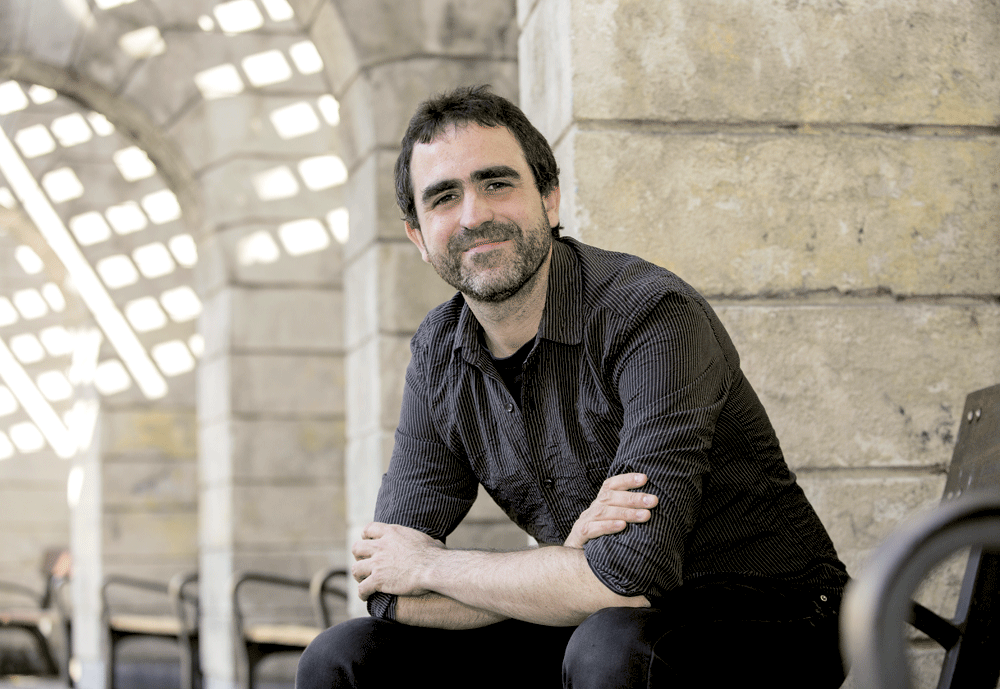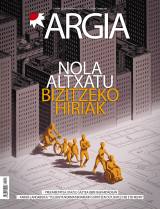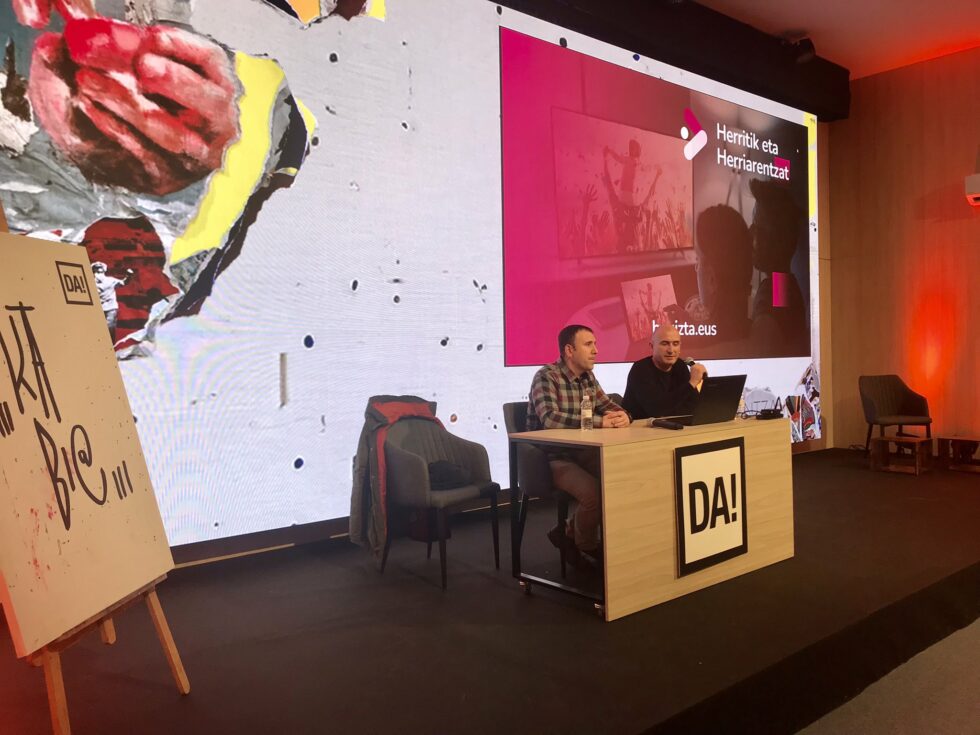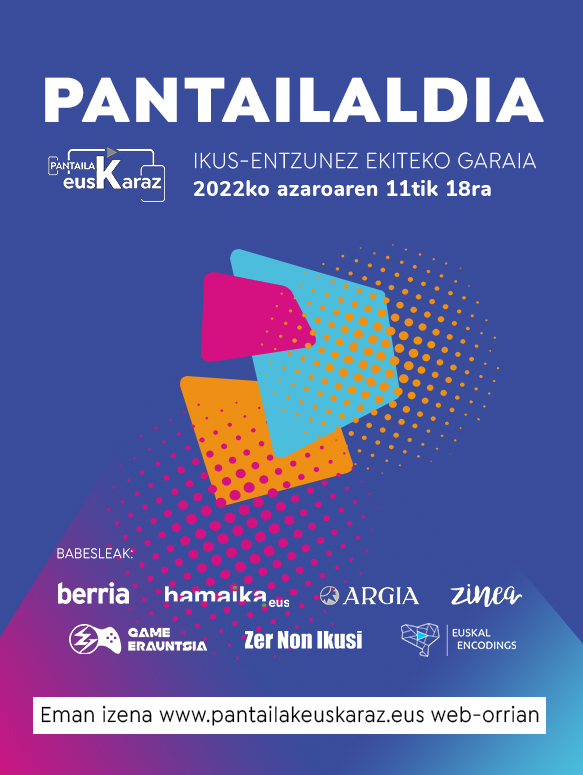"I suspect we're playing underneath our possibilities, as a people and as an individual."
- In China, if you hate someone, you want them to live interesting times. Difficult times, that is to say. Xabier Landabidea is in the world of communication, investigating and jumping, and she knows that we are at a time when we can't do it. However, he doesn't feel despair, but he feels like a golden age for participation, testing things and being with people.

Ikus-entzunezko zientziak ikasi zituen EHUn, telebista-ohiturei buruzko doktoregoa egin zuen Deustun, eta irakasle ari da gaur egun, unibertsitate horretan. Gainera, Errota Digitala ikerketa-taldeko kidea da, eta hainbat komunikabiderekin kolaboratu du. Eremuz kanpo izeneko irratsaioa egiten du astero Eneko Olazabalekin, Bilbo Hiria eta 97 Irratietan, zinemaren eta beste hainbat konturen inguruan.
How many limes are you in?
Today it is very difficult to distinguish things… I am a researcher and a professor at university, but then I participate in a free radio. In principle, those two things have nothing to do with it, but then you take someone you know from your work to the radio, or vice versa. So, I don't know how many jumps I'm making, but I'm really happy to be where I am with everything that can be done today.
So we start from something concrete. He has completed a PhD thesis on television.
I studied audiovisual communication at the UPV. Then I did a master's in communication and I got the opportunity to do a Ph.D. at the Deusto Institute of Leisure Studies. When it comes to choosing the subject, I followed my obsession, because I believe that if today we talk about ways of structuring our leisure, we cannot fail to talk about the media and the media, television is at the centre. I started 7-8 years ago, and it was a very interesting time because television was at stake: the Internet came, the borders became tarnished, and we felt that changes were going to take place. At the same time, television, like the family, remained the main social institution.
What exactly did I want to know?
From an anthropological point of view, I was interested in asking people a very simple thing: What is television for you? I picked up people who were in very different places and times of life from Bizkaia, grouped myself into groups and started asking silly questions. Everyone knows what TV is, what is in the kitchen or in the living room, but together 7-8 people, and as in the group we get heated right away, we want to give our opinion and then the discussions arise.
You mentioned the anthropological point of view. Why theoretical framework did you investigate?
At that time I was very interested in the trend of grounded theory: instead of starting from established categories, let people talk and let us build the theory from there. You can go with your vision and with your superior look, that the TV is stupid, etc., but that doesn't really help you understand people's uses. Talking to people, for example, you realize that for many, television was an oasis. This can better explain why we consume TV as we consume.
How do we consume it?
My hypothesis and my results reflected that television has a lot of folds, which is not always the same. However, in the tertulias the following categories appeared again and again: disconnect, relax, rest, not think… That’s what TV offers us: I don’t want to choose a book, I don’t want to download a series, I want to turn on the device and someone offers me something. In this sense, despite the enormous technological changes, television still has a great force, because it is very cheap and consumed very easily, and that has a great force in today's living conditions.
“ETB is not going to be as sexist or as rude as Telecinco, but there it
is playing”
And how does television see a person who investigates television?
Well, I see him little, I suffer a lot. I am a great fan of Hamaika Telebista, I know that he is very minority, also in Basque, and that they are working very precariously, but I really like it, because it seems to me that they are exploring and that they are trying to open roads on Basque television, bringing to light some social issues that affect us.
What do you suffer from?
With more regulation television, especially with ETB. I feel this pain very closely: after the effort that has been made, after having reached a high degree of institutionalisation, it is very painful to know what model it follows and for what purpose we are using public television which employs 1,000 people.
What problems does ETB have from your point of view?
I see you with two main problems. On the one hand, it was decided in a moment to co-finance the public television model through advertising, and we could discuss it decisively, but the truth is that from a moment onwards the entrances to advertising became very important.
On the other hand, it has fallen completely into a particular set of audiences, and we do not have a proper paradigm/parameter to measure the audience of the Basque audiovisuals. We are playing with what is there and in that we are getting a smaller and smaller part of the cake, as some very profound transformations are taking place.
At the rate of who is dancing?
In short, ETB wants to approach the model promoted by private success chains in Spain. That's an ideological problem, because I think we don't create for that a public communication structure, and it's a problem from the point of view of the business model, because they don't get it and they're not going to get it. ETB will not achieve the communicative power that Telecinco or La Sixth have, because they will do better; we, in the end, will make a copy of them overwhelmed, somehow vascophony, with all the kakotx posts. We will not be as sexist and rude as Telecinco, but we are playing there. We stayed in a gray field and I think it's nothing interesting, and it doesn't work. Leire Palacios, in an interview with director Maite Iturbe, stressed that they are trying to show a sense of containment, but they are going down, losing their public function and, what I think is worse, they do not dare to reinvent the function that a public television radio should have today.
What should be the role of a public broadcaster?
Well, I don't know, but I think we should reclaim the classical function, those values of the Enlightenment: entertainment, information and training. But today the ecosystem has completely changed. For example, before, television had to broadcast news, when television was broadcast, the news was considered to be true. Today that is in doubt, then I would say that we should rethink the rhythm of television and give another calm to television with public function, linked to the idea of the weekly: why we do not work on the themes of the previous week, or we do a contextualization work… But we are precisely the opposite.

He stressed the importance of laboratories.
We need three labs. A content laboratory: There are 11 local TVs and some ETB content. We also need hearing laboratories: We have 400 meters of audios in the CAV, through them can we measure and know the customs and practices of two million people living in very different sociolinguistic situations? We know not. And the third, on a political level, we need another lab or participatory process to think about what public television radio is that we need in a few years' time for those of us who want and follow us. I think the alternative goes around: think and do and think.
You are a professor at the University of Deusto.
Yes, and I'm very happy. You see, universities are very media structures, very complex and very ineffective, like many organizations. At the moment, they are facing a very harsh neoliberal attack, they have to constantly demonstrate their level of excellence based on concrete parameters and there is constant competition, not so much for research, but for publishing articles in specific journals. However, the university also has this romantic part, it works with knowledge and ideas, we are in contact with students, students are always young, even though we age... It is very stimulating.
How does this neoliberal attack affect teachers?
I am desperate about the rush, the need to do, to do and to do: many people are taking low anxiety, there is a lot of pressure, we all work on weekends, we all work in the evenings… Xabier Gantzarain said that we were working in the meantime, and in our case something similar happens: You admit that you like it, and that's why you do it, but it has a significant exploitation load. Furthermore, I believe that the trend is on the increase.
What do you think of the University of Deusto?
Deusto also sees the contradictions I observe to ETB: it acts according to the parameters of others and continuously loses it; it does not think about the contribution it should make from parameters such as ours or ours. Is our real goal, for example, to publish in an English journal, whatever topic we write about, or should we talk about issues related to Euskal Herria? Should we encourage researchers to present international theses in English or should we have a plan to present theses in Euskera, knowing that it is important to disseminate knowledge in their own languages and that only we can do so as a Basque university?
How do research and passion relate?
You have to find other ways to do the things that you really want to do, because the university needs sources of money, and the client kind of tells you what you can do and how to do it. I have met with those who wanted to do things like me, in this case Gorka Salces and Koldo Diaz Bizkarguenaga, and we have created an unlikely structure: Digital Mill. Koldo was in Mondragon Unibertsitatea, Gorka in the UPV and I in Deusto. Without waiting for the authorization of our universities, we decided to create a partnership to be able to do things. Once the Association was created, the University welcomes it. On the contrary, if permission is requested, it is more difficult.
You have to look for slips, recognize them when you find them, and occasionally, cause those slips. It should not be a tremendous blow, but sometimes with a push you can open up cracks. Because, if not, the elephant always carries you.
Your biography on Twitter says that we are because we are going to be. Can you explain to us what that means?
I share that slogan with Beñat Irasuegi, the nostalgia for the future. This is the key to my optimism: the possibilities are there, the ones we have acknowledged and the ones we still have to acknowledge. I don't know what we're going to be, but I think we should dare to imagine what we want to be and start from there, build it from our workplaces and militancy, and enjoy it along that path.
One final thought?
I suspect that we are playing underneath our possibilities, as a people and as an individual. Speaking in an objective sense, we live in an impossible time, we have almost infinite tools and possibilities to inform ourselves, to relate to people, to know each other… And how do we manage that? Well, we add to the references we already know. I think we're a little useless. With that, I don't want to make a speech like this, that we're super passive and that we're all super alienated. I do this in the first person: I think there's a lot more chance of doing things, in many directions, than the ones we actually do.
Bilboko Begoña auzoan jaio, erribera ertzeko unibertsitatean lan egin, Otxarkoagan bizi: bere hiriaz galdetu diot Landabideari. “Ni errepresentatzen nauen sentsibilitate politikoarentzat etsigarria da Bilbo: kontserbadorea, oso klasista, konformista eta atzerakoia, abertzaletasun-berniz baten atzean. Aldi berean, erremediorik gabeko baikorra naiz: zer gauza interesgarriagorik Bilbok Euskal Herriarentzat egin dezakeena asmatzeko lana baino?”.
Kanaldudek internetetik gure etxeko telebistetara jauzi egin du. Oraindik goiti, Free, Bouygues eta Orange internet hornitzaileen telebista boxen bidez ikusten ahalko da. Orain lanean ari dira SFR-en bidez ere ikusi ahal izaiteko. Horrez gain, webgune berria estreinatu dute... [+]
On the eve of the holidays a friend and I have managed to get together to catch a boat. We are on the table to discuss, albeit briefly, our last issues. I have a dear friend, but our lives make us less than we would like.
We use the delicious tar-tar. Shortly thereafter, a... [+]
B. It is one of the television references that marked the adolescence of A. He would like A to be an actor known as B. They both have a gang of friends that doesn't come out of the ordinary, but what differentiates is adolescence. B lived a stranger, participated in a public... [+]
I have not seen Teleberri for a long time, but for reasons that do not come to my rope I have been touched on the nights of Saturday and Sunday. And it is clear to me why I stopped putting television news.
Many years ago I was very pleased to see the informative ones, but over... [+]























